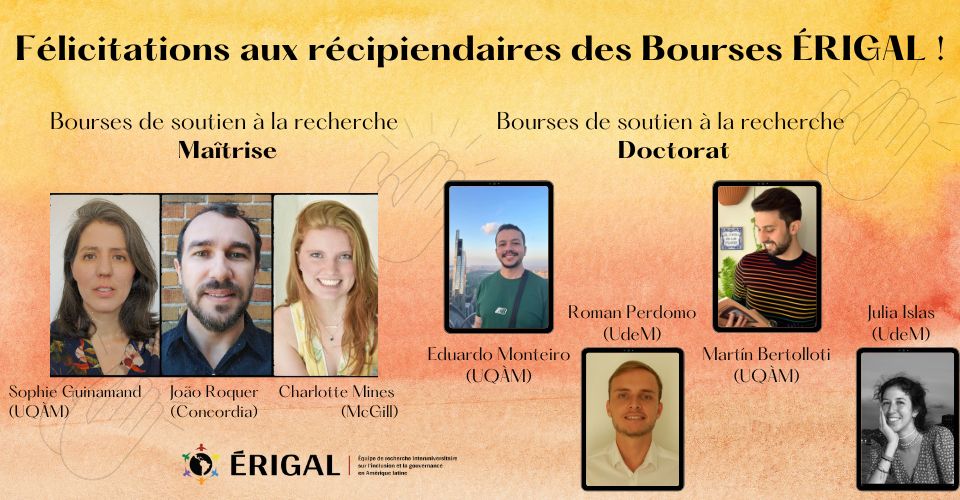Congratulations to the winners of the ERIGAL 2023-2024 scholarships!

ÉRIGAL is pleased to offer a total of seven research support scholarships for our students, for the 2023-2024 academic year! Our recipients all have exciting research projects!
4 doctoral scholarships of $3,000 have been awarded to the following students:
Julia Islas, currently a PhD candidate in Political Science at the Université de Montréal, where she is studying the impact of urban agriculture projects on public space in México. Her research focuses in particular on the role of urban agriculture in the reconfiguration of women's urban experiences in México. Her interest extends to themes related to care issues, feminist issues, and gender issues in public space, highlighting potential urban spaces conducive to feminist perspectives.
Roman Perdomo, a PhD candidate in Political Science at the Université de Montréal, attempts to understand how whistleblowers adapt their action to a context of weak institutions in Latin America. He also analyses the impact of whistleblowers in terms of social accountability. Indeed, whistleblowing can be a way to interpellate decision-makers to solve a public problem, so it is a mechanism that citizens use to held decision-makers accountable. In particular, he is comparing the contexts of Lima and São Paulo to understand if strong institutions and an autonomous civil society are factors that facilitate the impact of whistleblowers
Martín Bertolotti, a PhD candidate in political science at the Université du Québec à Montréal, is interested in the legalization of sexual citizenship in Latin America and the Caribbean. Over the past 20 years, Latin America and the Caribbean have witnessed an expansion of formal sexual citizenship for LGBTIQ+ people. The role of activist networks has been and remains fundamental to this expansion. These activists have noticed a favorable political opportunity structure in judicial systems, leading to changes within the movement, its strategies and its links with other social actors. How does the LGBTIQ+ movement perceive the existing political opportunity structure, and how does it construct political strategies? To answer these questions, Martin's work proposes a comparative study between a Central American state and a Caribbean state. This type of comparison is fairly uncommon due to the multiple differences. However, we argue that, from a macro viewpoint, both subregions are exposed to the same challenges, and that mutual understanding will show how much both can learn from each other.
Eduardo Nobre Monteiro is a doctoral candidate in political science at UQAM. His research project, entitled "Les effets concrets du discours populiste de droite sur les populations minoritaires: regards comparés entre Québec et Rio de Janeiro", aims to study the impact of right-wing populism on minority populations in two distinct contexts: Quebec City, Canada, and Rio de Janeiro, Brazil. Populism is defined as a discursive political logic that pits the "people" against the "elite", with an underlying political ideology. In the case of the contemporary right, this opposition often includes a minority population, usually racialized. The study will examine how populist discourse affects minority populations once populists come to power, until the end of their first term. The effects will be assessed in terms of inclusion and exclusion, governance and government practices towards minorities. The research will use John Stuart Mill's concordance methodology to prove causal inference in these two very different sub-national contexts.
3 scholarships of $1500 have been awarded to the following Master's students
Sophie Guinamand is a master's student in political science at UQAM, majoring in feminist studies. She is interested in feminist and women's movements in Latin America. Her dissertation project focuses on feminist artivism during the 2019 social revolt in Chile, taking as a case study the performance Un violador en tu camino by the Chilean feminist collective LASTESIS. Drawing on the concept of acuerpamiento, developed by Guatemalan community and territorial feminist Lorena Cabnal, Sophie orients her research on artivism as a process of resistance, but possibly of healing, in the political sense of the term.
João Roquer is a master's student in political science at Concordia University. His research project addresses the issue of how creative workers have been resisting the precariousness of labor on online platforms. The emergence of music streaming platforms, such as Spotify, has changed how music is produced, distributed, and consumed, but old problems, such as instability and lack of fair payment, persist and, in some cases, have become more serious. Meanwhile, many studies have denounced the concentration of big tech's power and the damage they cause to public values, such as privacy, security, transparency, and democratic control. The adverse effects on work organization are widely discussed, but in some sectors, such as music production, there are many unknowns about the future of work and decent living conditions. Therefore, this study seeks to address the workers’ resistance and understand the limits and possibilities of collective organizations in the gig economy in Brazil and México.
Finally, Charlotte Mines is a master's student in political science at McGill University. Her research project explores the extent of state power through an investigation into the influence of state framing on state-community relations in coca-dominated regions of Peru and Bolivia over the past two decades. While Bolivia, under President Evo Morales (2006-2019), adopted a permissive coca policy recognizing its economic and cultural significance, Peru maintained a security-oriented approach, resulting in conflicts with local communities. This study challenges the perception that regions with illicit economies are inherently lawless and violent, arguing that such economies can foster local order and stability, particularly among marginalized groups. The central thesis asserts that criminalization policies negatively impact state-community relations in areas reliant on illicit goods. This claim is supported by analyzing three facets of the state-community relationship in coca-dominated regions: 1) regional and local government policies and narratives, 2) community attitudes, and 3) socio-economic development, including crime rates, economic output, and state provisions like police budgeting. Comparative analysis between Bolivia and Peru and within coca and non-coca regions sheds light on the varying effects of criminalization policies on the coca economy.
Congratulations once again to our students!


